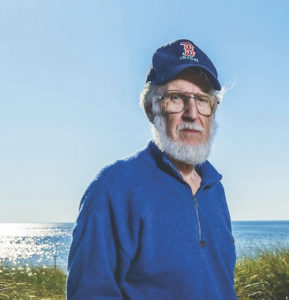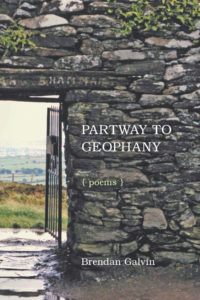Editor’s note: Truro poet Brendan Galvin’s 19th volume of poems, titled Partway to Geophany, was published by Louisiana State University Press in November 2020. Galvin’s many awards include a Guggenheim Fellowship, the Sotheby Prize of the Arvon Foundation, the Iowa Poetry Prize, the Levinson Prize, and two fellowships from the National Endowment for the Arts.

The word “geophany” is defined by Tim Robinson in Dublin Review as language that engages in “a secular celebration of the Earth, with the height and power of the religious tradition but purged of supernaturalism.”
We asked Galvin to introduce a selection of poems from his new book, which are reprinted here by permission of the author.
The woman in “February Light,” “You, and the Ursus Remembered,” and “There Are Times I Need to Forget You” and I were companionable for years. She passed away several years ago, but the hour hasn’t passed that I don’t think of her. She was a professional jazz singer, acted off-Broadway, wrote essays, fiction, and some astonishing poems.
“Stragglers” is in part based on a summer spent in a shack on Long Pond, Wellfleet, in 1961, with a couple of buddies who are now gone. Birds occupy a prime place in my work because I live in the Truro woods and feed whichever’s around, even a few from down South these days, and some who aren’t supposed to be here at all ever. I even have a deer who visits and hangs around fairly often.

“Arriviste Houses” tries to honor Edwin Hopper, one of my heroes, and contrast his work with that built around his South Truro studio. I cannot prove that Ben Shahn and John Dos Passos lived nearby and that the three never met, but it strikes me as typical of artists and the Outer Cape. Edwin O’Connor, whom I used to see on the streets of Wellfleet, was my first writer-hero as a kid. What Luck! I should mention Stanley Kunitz, too, because he once said, “Lord, Lord, who has lived so long?”
February Light
Now the sun begins
greening up the amaryllis’s
long but harmless blades
so it looks close to popping
a red flower in the bay window.
Afternoons the woodstove
seems less hungry,
but the difference this year
is you coming down the walk
through this light, improving it.
Emailing each other
at the same moment so often
had almost convinced me
we were meant for one another,
my darling, it was someone’s
intention for us, or something’s,
but we finalized it
that night you bespoke me
from your sleep with “What’s
the Greek word for Death?” Sure
we talk to each other in the dark,
and rub our stories together,
your voice like a new flavor
of ice cream, but that night
sleep must have cleared my mind
entirely and I told you Thanatos,
proof we belong side by side
in one bed forever.
Stragglers
The upside-down face of Captain Kangaroo
I woke to years ago on a couch behind
unfamiliar children watching TV, my terror
that all I drank at a wedding rehearsal
the night before had scrambled
my ocular equipment. I was the straggler
then, and that was one kind of astonishment,
but these days it’s more likely to be
a sparrow bedraggled by three days of rain,
a wild underhang of feathers
below its tricolor brown, black, and white,
until I notice the bird’s way too hefty,
the beak’s pink and wrong, and that’s
not a sparrow’s grab-and-go at the feeder.
It is hanging around as if lost, a blow-in
on a northeast storm who has followed
the locals to a seed source, its white eyestripe
at first perhaps a Peabody bird’s,
then another kind of astonishment:
it may be a rarity from one of those islands
where puffins are a food staple
instead of a postcard. Good enough,
but just once more I wish another
memorable face were studying my sleep
through the window screen at Long Pond,
a foot away and taking me in so benignly
that ever since I’ve believed
St. Francis had a dog called Brother Beagle.
You, and the Ursus Remembered
When you said you wished a ferry
ran between Montauk and Truro,
I remembered the Ursus
Jim Surrey and I built forty years ago.
Writing all morning, the afternoons
given to sawing and planing, driving pegs
with mallets, by September our carpentry
had the shape of those double-enders
That carry drinking water among
the Greek isles, its beam the width
of a Block Island Cowhorn’s.
Jim and the Ursus have sailed only God
knows where, Love, and each year
about this time a change of air proves
bittersweet at best, but if it anchored now
in Pamet Harbor, I’d sail for
Block Island today, then for you
and Montauk, and bring you here
for the nightly owl network and the morning
Corn Hill walk with me, then the sun
on our bedroom deck while I whistle
two redtail hawks into a circle
above our heads, or perhaps
bet on a chipmunk race.
Or lie in bed tonight hearing
the rain talk and telling each other a few
things we know: I’d open one eye
and look at you slyly as I said,
quoting Santayana, “To feel beauty
is a better thing than to understand
how we come to it.”
Then you’d reply how you learned
that condors can sometimes fly
as high as jets, like 30,000 feet,
and I would ask if you knew that
a shooting star is a flying rock,
and you would say Basho said “A poet
becomes the thing observed and enters into it.”
With that coming at me like a bullet of joy,
I would say, “You flip my pancakes every morning.”
Arriviste Houses
around Hopper’s studio, South Truro
At night houselights in fog
trick them out like cruise ships;
by day they are structural
wonders: here a flying doran,
over there a pair of cantilevered
geagers. From a corner of the eye
you might catch them trying
to crab-climb the hill and feed
on any tidbit of the man
who worked in that common place
on the hogsback up there,
another kind of vessel, oceanic
miles of light falling through
its thirty-six north panes
without impediment. Before
the isolation that clustered
those shells of glass and sticks
together, it stood the dunes
alone, an austere cape where
he pursued “sunlight on the side
of a house.” Obsession,
that dirty word: Corn Hill,
Marshall’s Place, The Methodist
Church, before the personae
inventing themselves out loud
on cell phones in
the post office parking lot.
There Are Times I Need to Forget You
On this ladder, under the sped-up clouds,
for instance, when a week’s weather’s
spun and dispersed in an hour,
and I’ve been fighting nudges at the edge
of concentration, recalling the way
you used to look on the banks of the river
in your black one-piece swimsuit.
I adored you from your smallest toes
to your longest hair, and the parts
between. But forgive me, I need to forget you
up here where paint’s blistered dry
as the papery nests of hornets,
and caulking peels off in shoelace lengths.
In the three years I needed you most
you sang to me in your Off-Broadway
phrasing, “You’re my guy, it’s time you knew,
all I am belongs to you,” and I returned,
“I love you, Savannah’s mother, and my love
is true. Remember, Savannah’s mother,
I’m a one-girl guy.” Or words to that effect,
not Off Broadway, just off.
Not true but generous, you claimed I had
a voice, even as the world was drifting away
that had given you venues on Rush St.
and at posh hotel lounges. Now you are under
midwestern snow. If I keep wishing
you were gripping the lower rungs
while I’m up here drawing a bead on seams
in corners where snow will build
and stay on inventing shades of blue,
snow will find its way in.



